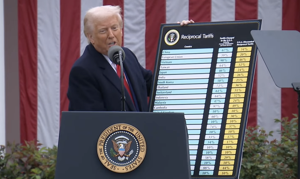(The Center Square) – A coalition of 20 attorneys general is requesting the U.S. Court of Appeals reverse a district court decision upholding Delaware’s ban on “assault weapons” and certain magazines.
Republican Montana Attorney General Austin Knudsen led the group in filing an amicus brief in support of the Delaware State Sportsmen’s Association, Inc., in their case against the Delaware Department of Safety and Homeland Security. They argue two Delaware bills violate the Second Amendment.
House Bill 450, known as the Delaware Lethal Firearms Safety Act of 2022, was signed into law last year by Democratic Gov. John Carney. It prohibits the “manufacture, sale, offer to sell, transfer, purchase, receipt, possession, or transport of assault weapons in Delaware, subject to certain exceptions.”
A media release from Knudsen’s office said the law bans 44 semi-automatic “assault long guns,” including the AR-15 and others, and 19 semi-automatic “assault pistols” and copycat weapons. Senate Bill 6 bans magazines capable of accepting or holding more than 17 rounds of ammunition.
“The Second Amendment stands as a reminder to state governments that ‘the people’ have a ‘pre-existing’ right to keep and bear arms,” the brief states. “And it extends to all ‘bearable arms,’ including arms carried ‘for offensive or defensive action in a case of conflict.’”
The 34-page brief argues Delaware fails to show the assault weapon and large-capacity magazine bans align with the nation’s tradition of firearm regulation. They argue the state failed to identify any relevant historical regulations similar to the regulations being challenged in the lower court.
The court must “do more than simply count the number of historical state laws restricting certain weapons – instead, courts must consider ‘whether modern and historical regulations impose a comparable burden on the right of armed self-defense and whether that burden is comparably justified,’” according to the coalition.
The AGs also state the district court failed to “engage in the nuanced analogical inquiry” required in the case, New York State Rifle & Pistol Association, Inc., v. Bruen. In this case, the U.S. Supreme Court ruled in 2022 New York’s concealed carry law was unconstitutional.
“The Second Amendment guarantees all Americans the right to bear arms for self-defense and other lawful purposes ‘subject to certain reasonable, well-defined restrictions,’” the brief states in its conclusion. “No doubt HB 450 and SS 1 were motivated by an understandable concern with the recent rise in mass shooting incidents, but they are inconsistent with this Nation’s historical tradition of regulating dangerous and unusual weapons.”
Attorneys general from Alabama, Arkansas, Georgia, Idaho, Indiana, Iowa, Kentucky, Louisiana, Mississippi, Missouri, Nebraska, New Hampshire, North Dakota, South Carolina, South Dakota, Utah, Virginia, West Virginia, and Wyoming signed the brief.














































